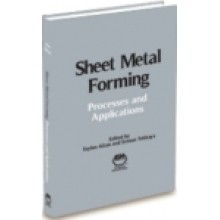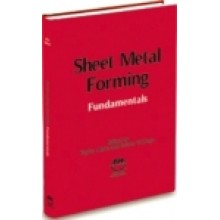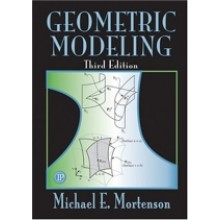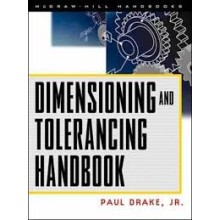Geometric Dimensioning and Tolerancing : Applications, Analysis & Measurement
Quantity:
-
Add to Compare
This book is written per the new ASME Y14.5-2009 standard. This is the most comprehensive GD&T volume ever written by a single author. Geometric Dimensioning and Tolerancing has the unprecedented ability to cover almost every facet of tolerancing. Time can be a limiting factor in topics to be covered in a workshop or course. . . but the book has it all!.Although based on the rules found in the ASME Y14.5 standard, it also covers topics from other recently published standards by ASME not found in older texts. It includes step-by-step procedures for dimensioning and tolerancing parts and assemblies. It shows how to analyze the tolerances applied using both worst case and statistical analysis. This book demonstrates the connection between the application of functional geometric tolerances and its effect on manufacturability and inspection, stressing optimal ways to achieve a high-quality product at the lowest possible cost to the customer.
Foreword
Chapter 1 : Symbols, Rules, Charts
Chapter 2 : Selecting a Tolerancing Approach
Chapter 3 : Datum Feature Simulators
Chapter 4 : Boundaries and Material Condition Symbols, MMC, LMC & RFS
Chapter 5 : Major Concepts of Geometric Dimensioning and Tolerancing
Chapter 6 : Form
Chapter 7 : Orientation
Chapter 8 : Profile
Chapter 9 : Runout
Chapter 10 : Concentricity and Symmetry
Chapter 11 : Datums
Chapter 12 : Centerplane Datums
Chapter 13 : Position With Fixed Fastener Assemblies and Projected Tolerance
Chapter 14 : Tolerancing Mating Parts in a Floating Fastener Assembly
Chapter 15 : Direct vs Indirect Relationships
Chapter 16 : Datum Targets
Chapter 17 : Datum Feature Scheme Choices
Chapter 18 : Flexible Parts
Chapter 19 : Position Boundary Concept
Chapter 20 : Why Use GD&T
Chapter 21 : Composite vs Two Single Segment Positional Tolerencing
Chapter 22 : Dimensioning and Tolerancing of Gages
Chapter 23 : Tolerance Stack-Up Analysis
Chapter 24 : How to be Specific in Calculating and Specifying Statistical
Chapter 25 : Tolerance Stack-Up Analysis in a 5-Part Assembly
Chapter 26 : Tolerance Stack-Up Created During Manufacture due to Changing Set
Chapter 27 : GD&T as a Language
Chapter 28 : Definitions
Index
Bibliography
Other GD&T Course Materials Written by James D. Meadows
Write a review
Your Name:Your Review: Note: HTML is not translated!
Rating: Bad Good
Enter the code in the box below:
Copyright © 2014 Engineering Standards Bureau. All Rights Reserved.
Developed By Zoom Into Web
















![Tolerance Stack-Up Analysis : [For Plus and Minus and Geometric Tolerancing], 2nd Edition](http://www.engineeringstandards.in/image/cache/data/Tolerance-220x220.jpg)


